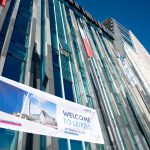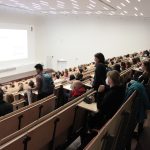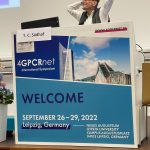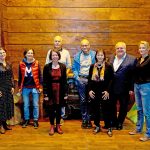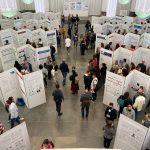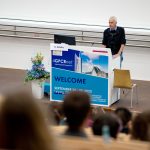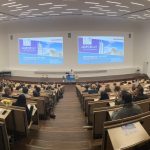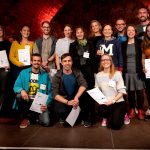International Symposium on G Protein Coupled Receptors (GPCR)
TWO NOBEL PRIZE WINNERS AS GUESTS AT THE UNIVERSITY OF LEIPZIG
[Press Release 04.10.2022, written by Anett Albrecht] In a new format, the conference “4GPCRnet” attracted researchers from all over the world to Leipzig and ended with the awarding of 12 young scientists in the Moritzbastei Leipzig. The highlight was the appearance of two Nobel Prize winners. The four largest European networks, the two COST Actions Adher’n Rise and ERNEST, as well as the DFG-funded collaborations of the Collaborative Research Center 1423 and the research group FOR2372, have jointly created a platform for scientific exchange around the pharmaceutically important group of G Protein Coupled Receptors (GPCRs).
One third of all our drugs act through this class of molecules. These include drugs for high blood pressure (beta blockers), asthma, hay fever, but also antidepressants and drugs for osteoporosis. However, only a part of the approximately 800 human receptors are currently used. To better understand the mode of action of these receptors was the goal of the “4GPCRnet” conference, which was held for the first time in this form in Leipzig from September 26 to 29, 2022. Around 500 scientists from more than 30 countries came to exchange information on the current state of affairs in more than 90 lectures in various formats and more than 200 posters.
Highlights of the program were the two lectures by Nobel Prize winners Thomas Südhof and Brian Kobilka (both Stanford University, USA). Their research groups were again able to show outstanding results on the role of adhesion GPCRs, a group of the GPCR family, in the development and function of our nervous system as well as on the molecular activation mechanism of GPCRs. “Especially the still relatively young research field of adhesion GPCRs benefits greatly from the range of experience and expertise of established scientists,” emphasizes Ines Liebscher from the Leipzig University. “In this context, we are of course particularly honored to be able to personally welcome Thomas Südhof here as one of the best-known representatives of the adhesion GPCR field,” adds Simone Prömel from Heinrich Heine University Düsseldorf.
It became very clear that this lively and highly topical field of research will enable the development of new drugs. Having just provided an insight into the molecular mode of action through structures, the next step will be to understand the dynamics of these receptors. For it became clear that these molecules are more than just on and off switches on cells, but can assume many different states. The effects and side effects of drugs demonstrate this. Using artificial intelligence methods, the relationships can be better understood down to the level of individual patients.
The high-caliber international line-up of the panel as well as the diversity of the program contributed to the fact that both interdisciplinary and specific facets of research around GPC-receptors were given a stage. In addition to content-related impulses, the “4GPCRnet” also relied on experience and networking opportunities, which were intensively used after the restrictions of the past years. These impulses were soaked up by participants and scrutinized in detail at the posters. “I have never seen so many posters on GPCR at a meeting,” said Heidi Hamm (Vanderbilt University, USA). “Science must be understood as a community task for society, which can only be successfully mastered on the basis of interdisciplinary collaboration. We were able to experience during the ‘4GPCRnet’ that there is a great desire for this, and now it is a matter of implementing these new research impulses,” says Annette Beck-Sickinger, spokesperson of CRC1423 at Leipzig University.
Co-Chairs of the 4GPCRnet International Symposium
Prof. Dr. Annette G. Beck-Sickinger
(Leipzig University, Chair of SFB1423)
Prof. Dr. Andreas Bock
(Leipzig University & Max Delbrück Center of Molecular Medicine, Grant Holder of CA18133 ERNEST)
Prof. Dr. Evi Kostenis
(University of Bonn, Chair of FOR2372)
Prof. Dr. Dr. Ines Liebscher
(Leipzig University, Grant Holder of CA18240 Adher’n Rise)
Prof. Dr. Simone Prömel
(Heinrich Heine University Düsseldorf, Chair of CA18240 Adher’n Rise)
Dr. Martha Sommer
(ISAR Bioscience, Chair of CA18133 ERNEST)


